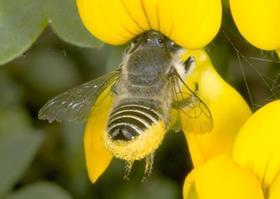
Environmental organisations are calling for the suspension of neonicotinoid pesticides in the UK following the release of a report by conservation trust Buglife on their effect on the health and lifecycle of bees.
Wild bee populations in the UK have recently experienced a widespread decline, causing a danger of increased crop failures.
A number of fruits rely heavily on bees for pollination, including berries, topfruit and stonefruit, in addition to many vegetables.
The new report demonstrates that bees eating nectar and pollen contaminated with imidacloprid, the commonest neonicotinoid, go on to forage less and produce fewer offspring.
Buglife, the Soil Association, Pesticides Action Network and Bumblebee Conservation Trust are calling for the suspension of all UK approvals for products containing neonicotinoids that are used outdoors and a review of all neonicotinoid approvals.
These organisations are equally demanding the introduction of more comprehensive methodologies for assessing the effects of pesticides on “non-target invertebrates”.
'Other countries have already introduced bans to prevent neonicotinoids from harming bees,” said Matt Shardlow, CEO of Buglife. “This is the most comprehensive review of the scientific evidence yet and it has revealed the disturbing amount of damage these poisons can cause to bees – it is now time for `UK environment secretary` Hilary Benn to act.'
'The UK is notorious for taking the most relaxed approach to pesticide safety in the EU,' added Peter Melchett, policy director at the Soil Association. 'Buglife’s report shows that this puts at risk pollination services vital for UK agriculture.'
The problem of bee loss is not restricted to the UK. In Turkey last year, cherry production fell by around half, a drop thatwas attributed in great part to a reduction in the number of bees forpollination.






No comments yet